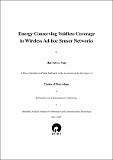Energy conserving voidless coverage in wireless ad-hoc sensor networks
Abstract
For many sensor network applications such as intrusion detection and military surveillance, it is necessary to provide full sensing coverage to a security-sensitive area while at the same time minimizing energy consumption and extending system lifetime by leveraging the redundant deployment of sensor nodes. It is also preferable for the sensor network to provide surveillance service for target areas with different degrees of security requirements.
In this thesis, an established scheme that aims at adaptable energy-effect sensing coverage is analyzed. In this scheme, each node is able to decide a schedule for itself to guarantee a certain degree of coverage (DOC) with average energy consumption inversely proportional to the node density.
An enhancement to this scheme is suggested. The validity of the proposed extension is proved though the simulations that address the issues of total energy consumption, balance of energy consumption, half-life of the network, coverage percentage over time, energy consumption for α coverage and actual degree of coverage. Comparisons are made with the two existing schemes namely ‘Adaptable Sensing Coverage Scheme’ and Sponsored Coverage Scheme’.
These simulations show that the proposed scheme accomplishes α-coverage surveillance with low energy consumption. It outperforms other state-of –art schemes by as much as 50% reduction in energy consumption and as 130% increase in the half-life of the network.
Collections
- M Tech Dissertations [923]

